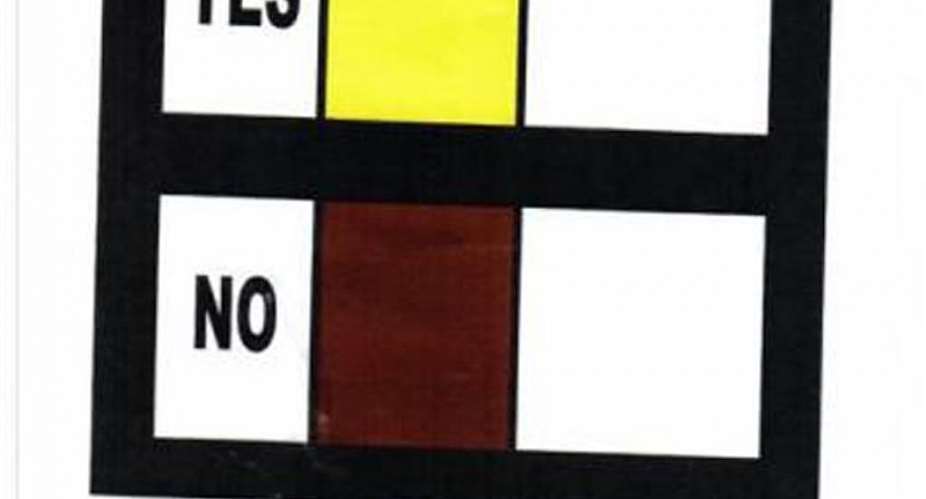Politics at its height is about policy decisions in order to realise one thing; ensure a decent, quality and happy life for people in a geographical area. In Western democracy, the means for delivering on this state-citizen commitment has always been through a system of multi-party democracy. The winning party forms a government, be it at the local, regional or national level. The scheduled Referendum on December 17 (to inaugurate political party participation in district level election) has seen tremendous stakeholder opposition of late. At the moment, the ‘Independents’ have emerged and as if to ‘fire fight’ proposed that the Referendum be suspended altogether to allow for increased capacity building of Ghanaians on the subject matter. Well, that is the beauty of democracy.
The YES and NO arguments can be theorised as follows: The advocates of YES espoused the credentials of multi-party democracy and the need for Ghanaians to continue to walk the path in the spirit of the 1992 Constitution. This group of advocates can be described as the Idealists. The NO people (who can be called the Realists) tapped into the negative manner in which multi-party democracy is practised at the national level and argued the dire consequences should the door be opened for political party participation. The position of the two groups is akin to the preacherman telling his congregation about heavenly inheritance and the need to sow seeds for the spirit. But then the flesh sees things in a different light, it says to the spirit, ‘wait a minute, good as heaven is, the physical needs must be satisfied first on earth’. In effect, the flesh ‘fights’ against the spirit. No doubt, the advocates (of YES and NO) know that there is some level of truth in what the other party says. It is laudable to deepen multi-party democracy but the way we have practised it over the years is the problem. What happened?
- The individual politician has more or less lost self-identity to collective party identity. People reason and act based on loyalty to party rather what is good, just and ought to be done. It looks very much like moral courage has deserted politicians;
- Irresponsibility and self-denial where party followers will support a member no matter the wrong committed;
- Party and party members must benefit first policies;
- Road blocks for the opposition;
- Information manipulation;
- Accumulation of resources towards the next election;
- Attacks on the person rather than the issue at stake;
- Winner takes all;
- Pride and ego of office holders;
- Divide and rule;
- Indiscipline, cronyism, favoritism, and what have you.
The above points are anathema to building a prosperous nation. As to how well the needs of the people (which is the essence of governance) have been met by our multi-party system, is a question that must be answered one day.
Granted that the argument of the ‘Independents’ (that the Referendum be suspended) carries the day, we will face another problem. How long must it wait? Will anything ever change in partisan politics are the national level to warrant its second coming? Above all, are politicians prepared for any change at all?
Maybe when we opt for election of MMDCEs, we will have no choice but to re-do the following:
- Deconstruct national level institutions and processes
- Reconstruct the regional level and
- Construct the local level in accordance with what best gives the people a decent, quality and happy life.
Perhaps, what will be different from our current decentralization system is that there will be popular agitation to remake the Ghanaian State bottom-up. The absolute power that the multi-party system wields at the national level (over decisions and resources) will eventually cave in.





 Akufo-Addo commissions Phase II of Kaleo solar power plant
Akufo-Addo commissions Phase II of Kaleo solar power plant
 NDC panics over Bawumia’s visit to Pope Francis
NDC panics over Bawumia’s visit to Pope Francis
 EC blasts Mahama over “false” claims on recruitment of Returning Officers
EC blasts Mahama over “false” claims on recruitment of Returning Officers
 Lands Minister gives ultimatum to Future Global Resources to revamp Prestea/Bogo...
Lands Minister gives ultimatum to Future Global Resources to revamp Prestea/Bogo...
 Wa Naa appeals to Akufo-Addo to audit state lands in Wa
Wa Naa appeals to Akufo-Addo to audit state lands in Wa
 Prof Opoku-Agyemang misunderstood Bawumia’s ‘driver mate’ analogy – Miracles Abo...
Prof Opoku-Agyemang misunderstood Bawumia’s ‘driver mate’ analogy – Miracles Abo...
 EU confident Ghana will not sign Anti-LGBTQI Bill
EU confident Ghana will not sign Anti-LGBTQI Bill
 Suspend implementation of Planting for Food and Jobs for 2024 - Stakeholders
Suspend implementation of Planting for Food and Jobs for 2024 - Stakeholders
 Tema West Municipal Assembly gets Ghana's First Female Aircraft Marshaller as ne...
Tema West Municipal Assembly gets Ghana's First Female Aircraft Marshaller as ne...
 Dumsor is affecting us double, release timetable – Disability Federation to ECG
Dumsor is affecting us double, release timetable – Disability Federation to ECG
